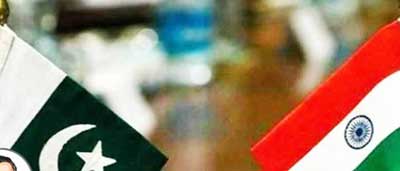Relevance: GS-2 : India and its Neighbourhood- Relations
Key Phrases: Exceptional restraint shown by both countries in handling India's accidental firing of a missile; normalising relations; GSAT-9 Satellite or South Asia Satellite; SAARC’s motor vehicles agreement; TAPI Pipeline.
Context
- Recent times have seen encouraging developments for India-Pakistan
relations.
- Exceptional restraint shown by both countries in handling India's accidental firing of a missile.
- An Indian trader sent a consignment of sugar from India to Uzbekistan via Pakistan.
- Prime Minister Imran Khan had praised India's independent foreign policy.
- Could these events be a positive development in improving the relations?
Key Highlights
- These events pose a familiar dilemma.
- Is Islamabad signalling interest in normalising relations?
- Can Pakistan be trusted on political and security engagement?
- India must move ahead in Geo-Economic terms to favourably shape tomorrow's terms of connectivity with Pakistan.
The Past
- Atal Bihari Vajpayee and Manmohan Singh's strategy of economic interdependence to soften the India-Pakistan border looks like a distant dream.
- It is difficult to think of a peace- time period when India and Pakistan were less connected than today.
- SAARC’s motor vehicles agreement (MVA) and joint satellite (GSAT-9) were all rejected by Pakistan’s establishments
- Plans for an integrated power grid and energy interdependence have
fizzled out
- Including the Turkmenistan-Afghanistan-Pakistan-India (TAPI) gas pipeline
The Potential and the Status Quo
- The World Bank estimates India-Pakistan trade potential to
be $37 billion, compared to the actual $2.4 billion in
2017-18.
- This has now further declined to a mere $400 million.
- While the world negotiates supply chains and trade deals to integrate different regions, India and Pakistan have created a commercial abyss that divides South Asia.
- No major investment in border infrastructure has been seen for almost 10
years since India opened its first Integrated Check Post (ICP) at Attari.
- There are now over 60 border crossings with northern and eastern neighbour countries, but only one formal crossing with Pakistan.
- Of the 23 ICPs India plans to build by 2025, none is located on the border with Pakistan.
- Pakistan has become comfortable with engagement with China to offset its
growing connectivity gap with India.
- Civilian leadership has let army handle it’s engagement with India
Way Forward
How to achieve the new normal
- In order to limit domestic opposition, the plan must not revolve around politicised topics. This means following the strategic sequencing of the 2000s by not involving Kashmir.
- Second, investing in hard infrastructure to offer spill over incentives
that target specific Pakistani economic constituencies, especially sectors
located in the border regions and industries that would benefit from India
as an export market.
- This includes trade, transportation and labour segments that are hurting from Islamabad's decision to suspend trade.
- Finally, any non-reciprocated initiative should be promoted
diplomatically in order to place the ball in Pakistan's court.
- This will expose Islamabad to international pressure and call its bluff, for example when its National Security Policy proclaims that shared economic opportunities are the cornerstone for achieving prosperity in Pakistan and the region.
What is to be done?
Two unilateral initiatives satisfy these conditions.
- Lowering import duties on Pakistani goods.
- After the Pulwama attack, Delhi withdrew the Most Favoured Nation status and raised the basic customs duty to 200 per cent.
- Reversing this would send a clear signal, and also put the onus on Islamabad to revise its own decision to suspend trade.
- Trade-intensive sectors would likely mobilise to push Islamabad to reciprocate.
- This includes the textile industry, which constitutes Pakistan's largest global export and was heavily dependent on cotton imports from India.
- To unilaterally improve cross-border infrastructure.
- New Delhi should massively finance the development of its last-mile road, rail and air network in the peripheral border areas of Gujarat, Rajasthan and Punjab.
- This will not spur domestic development and attract attention from the Pakistani borderland economies.
- New ICPs could be set up along the border at Hussainiwala, Munabao, Suchetgarh or Nadabet.
- At the cost of approximately Rs 150 crore, each new ICP is a bargain investment in the geo-economics future of India's borderlands.
Conclusion
- As our former PM (Atal ji) has mentioned that we can choose our friends but not our neighbours. In this light India must take such unilateral initiatives which are simple, low-cost ways for Delhi to reverse the lost time and rising costs of India-Pakistan disconnectivity. Even if they fail to immediately alter Pakistani behaviour, they will still help India reap the benefits of trade and mobility when the sunny day of political normalisation finally arrives.
Source: The Indian Express
Mains Question:
Q. How can India-Pakistan relations see a renewal. Answer from the perspective of the recent developments.









